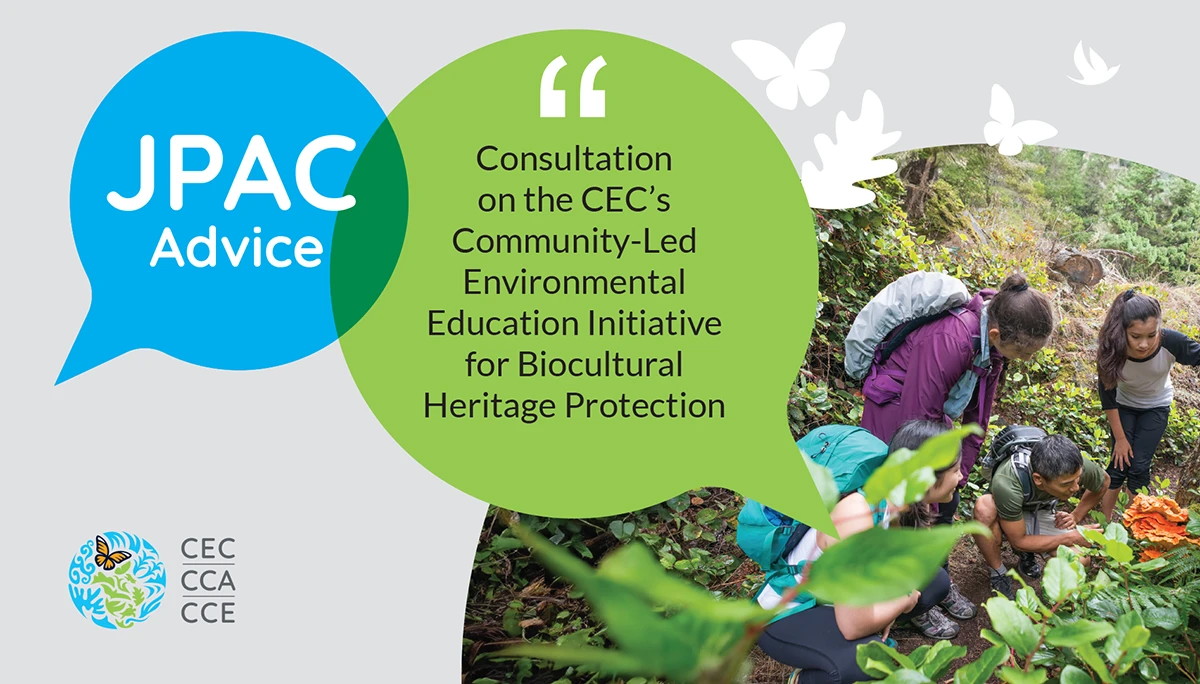JPAC Advice on new CEC project: Community-led Environmental Education Initiative for Biocultural Heritage Protection
The Commission for Environmental Cooperation's (CEC) Joint Public Advisory Committee (JPAC) has just submitted an Advice to the CEC Council regarding a new initiative that will develop and pilot an environmental education framework that considers diverse knowledge systems, including, but not limited to, Indigenous Knowledge Systems (IKS), Traditional Ecological Knowledge (TEK), and academic knowledge, to support efforts by vulnerable communities to tackle local environmental challenges and take climate action. The goal of the framework is to support and advance community-led conservation and climate action.
The Advice stems from the public consultation on the proposed project that took place from 4 to 25 March 2024. JPAC received a wide range of public comments that included recommendations for strengthening the project’s objectives and activities. Based on the comments from 69 respondents, representing a diverse group of actors throughout North America, the JPAC Advice highlights the importance of the following topics and provides recommendations on how to address them.
JPAC Recommendations
Among the potential challenges identified, members of the public emphasized how risks of overlooking specific environmental needs, context, and cultural aspects could hinder the project’s implementation and future replicability. To address these challenges, members of the public suggested:
- Conducting community diagnostics to tailor project implementation;
- Ensuring the framework’s flexibility to adapt to diverse contexts;
- Implementing a distinction-based approach.
Another significant challenge identified was the imperative to engage and cultivate robust, long-term relationships with a diverse array of actors to ensure successful implementation of the initiative. The recommendations provided by members of the public to address this challenge effectively included:
- Collaborating closely with local entities, such as educational institutions, nongovernmental organizations, land trusts, local businesses, and government agencies;
- Embracing a bottom-up approach throughout various project stages;
- Implementing measures to ensure the participation of marginalized or underrepresented groups.
Members of the public also underscored the importance of building trust and fostering collaboration with Indigenous communities, as well as establishing principles for the transmission of IKS and TEK. Recommendations regarding these challenges included, among others:
- Identifying and addressing the specific needs, customs, and preferences of Indigenous communities involved in the project, as well as their uses and customs;
- Promoting mutual collaboration and respect in the understanding, transmission, and preservation of IKS and TEK;
- Adopting an intergenerational approach to participation.
Public comments also provided recommendations to strengthen the environmental education framework, including:
- Conducting an in-depth analysis incorporating a comprehensive literature review and interviews with key informants to identify best practices in biocultural education;
- Prioritizing practical and locally tailored training;
- Establishing an adaptive implementation plan to enhance the replicability of the educational framework across other communities.
Public comments received placed emphasis on the importance of ensuring the project’s long-term feasibility, by:
- Identifying mechanisms for knowledge production and reproduction, community planning, and financing or self-financing to ensure sustained support for the project.
Members of the public also shared examples of existing initiatives and identified opportunities to create synergies with individuals, communities, organizations and institutions.
JPAC is confident that the insights provided will be instrumental in guiding the development and implementation of this project, as well as related initiatives in the future.
JPAC extends its gratitude to all respondents for their valuable feedback and contributions.
Please click here to consult the full Advice.
If you would like to know more about CEC initiatives, opportunities and efforts, you can sign up for our newsletter and follow us on social media.

Joint Public Advisory Committee (JPAC) submits Advice to the CEC Council following public consultation on new CEC’s Community-led Environmental Education Initiative for Biocultural Heritage Protection.
About the CEC
The Commission for Environmental Cooperation (CEC) was established in 1994 by the governments of Canada, Mexico and the United States through the North American Agreement on Environmental Cooperation, a parallel environmental agreement to NAFTA. As of 2020, the CEC is recognized and maintained by the Environmental Cooperation Agreement, in parallel with the new Free Trade Agreement of North America. The CEC brings together a wide range of stakeholders, including the general public, Indigenous people, youth, nongovernmental organizations, academia, and the business sector, to seek solutions to protect North America’s shared environment while supporting sustainable development for the benefit of present and future generations
The CEC is governed and funded equally by the Government of Canada through Environment and Climate Change Canada, the Government of the United States of Mexico through the Secretaría de Medio Ambiente y Recursos Naturales, and the Government of the United States of America through the Environmental Protection Agency.